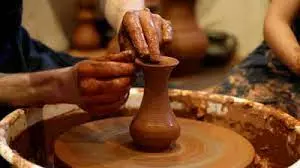Kummari Community Getting a Raw Deal: CESS study

Kummari Community Getting a Raw Deal: CESS study (Representtional Image)
Hyderabad: A study by the Centre for Economic and Social Studies (CESS) has flagged the backwardness of the Kummari community engaged in their traditional pottery vocation. The Kummari Shalivahana Co-operative Federation, which constitutes around 957 registered societies, is headed by an official and has no staff.
Categorised as one of the 130 backward communities in the BC-B group. It was found that grants given to the federation after the formation of the state were negligible.
Commenting on the study, Prof. C.H. Balaramulu, visiting faculty at CESS, Hyderabad, said, “The demand for pottery products has been limited to certain festivals, death ceremonies and at temples. The merchandise is then sold by intermediaries who pocket the gains.”
Kummari community members also face the problem of lack of raw material like clay, he said. “Investment is another major problem as they get only institutional finance. The model whereby bathukamma saris are purchased from weavers, who are provided raw material, should be replicated here so that the Kummari community survives. The advent of plastic has killed the traditional vocation,” Prof. Balaramulu said.
Flagging the laws that work against the interests of the community, the Andhra Pradesh Water, Land and Trees Act, 2002 (APWALTA) which has been adopted by the Telangana state government as well, and the GO No. 1076 (which came into force in 1979) were impediments for the continuation of the vocation, said Laxman Rao Sankineni, co-author of the study.
“WALTA restricts collection of clay from village waterbodies. This contradicts GO No. 12 and GO No. 274. While the former recognises the rights of Kummari people to collect clay from tanks and ponds, GO No. 274 allows them to collect firewood from the forest, free of cost,” said Harinath Siluveru, another co-author. He said that the BRS government had neglected traditional vocations.
The allocations, Harinath said, were immaterial; it should be seen if the money is going into procurement of machinery or buying products. The state should follow the railways example and promote their products.
There is no rationale in allocating `25 crore in one year and then failing to assign any funds thereafter, he added.
The study noted that the community remained uncovered by different labour welfare policies and schemes. They were neither registered with the labour welfare boards nor with Centre. This anomaly has not been addressed despite repeated petitions.
Such membership would give them access to life, accident and health insurance apart from financial assistance to families performing the marriage of daughters and pregnant women.
( Source : Deccan Chronicle )
Next Story

